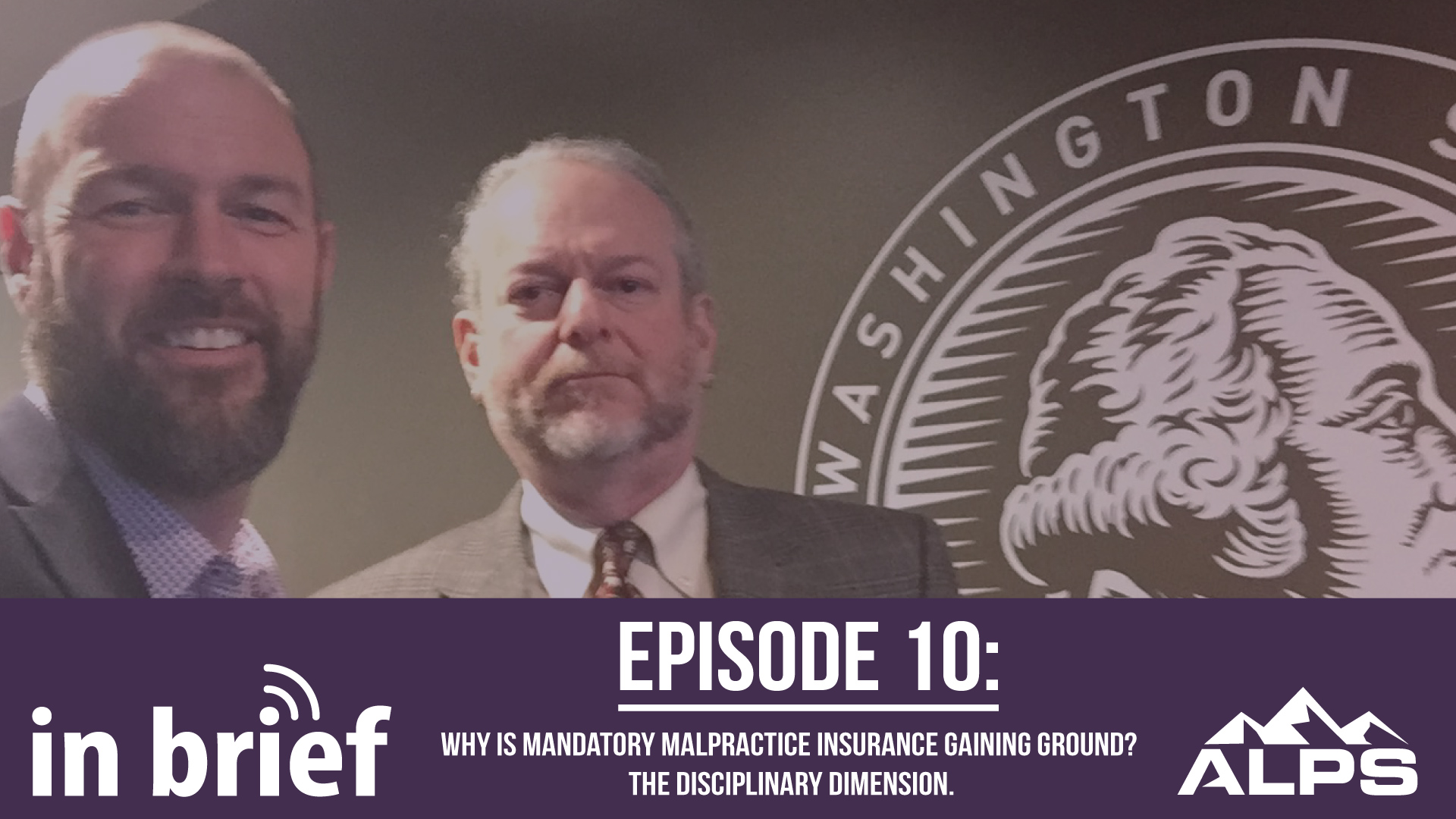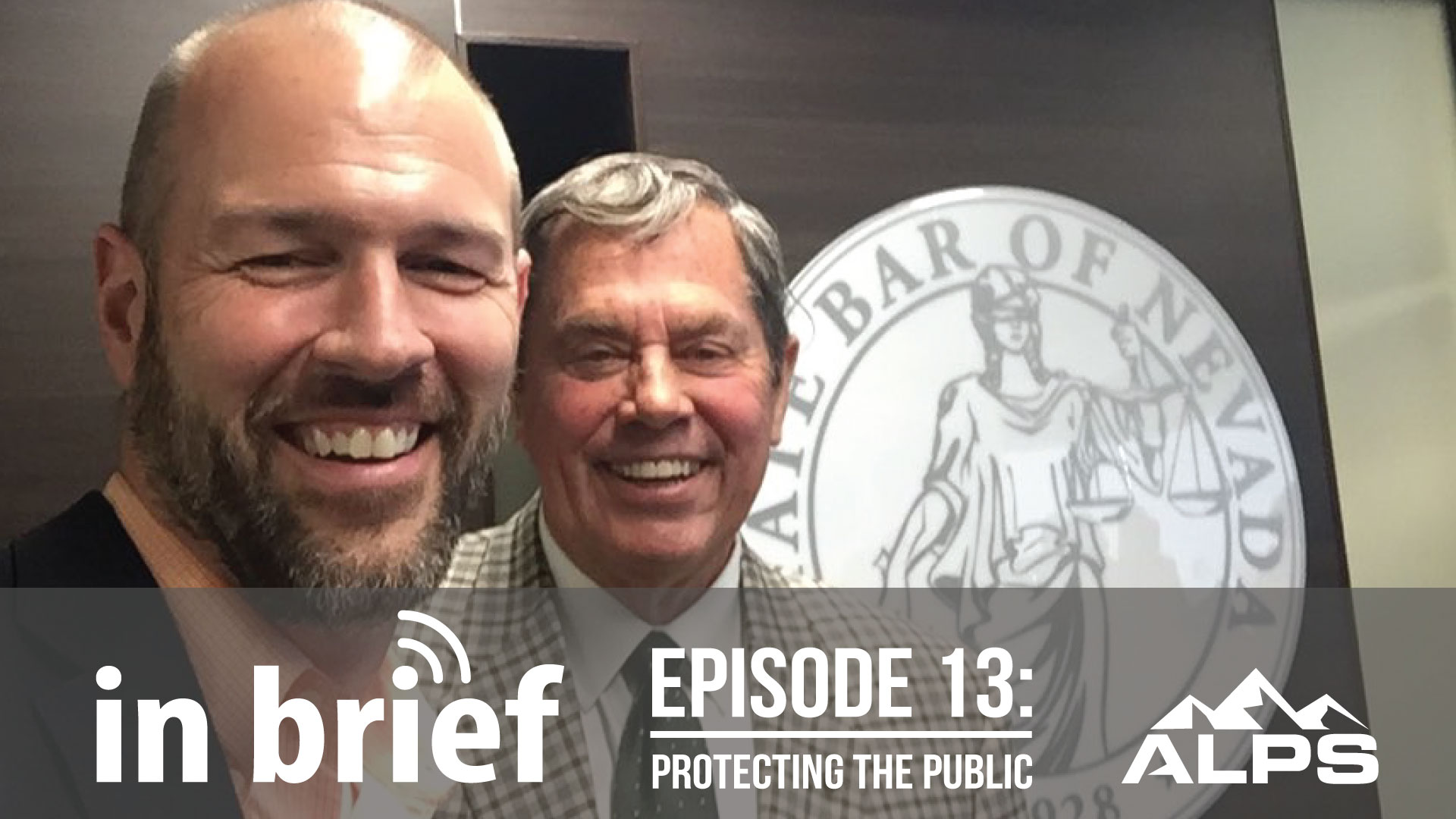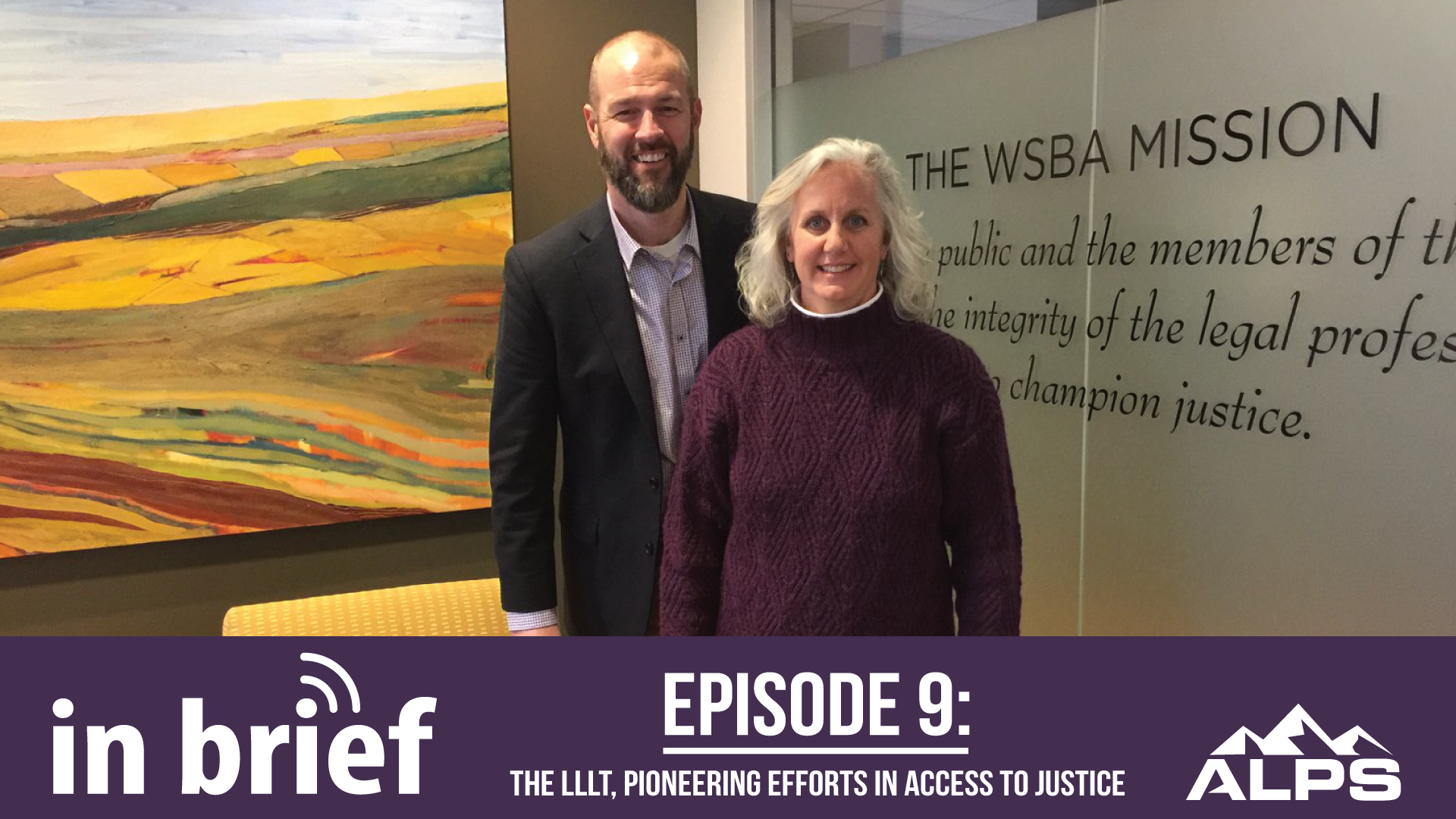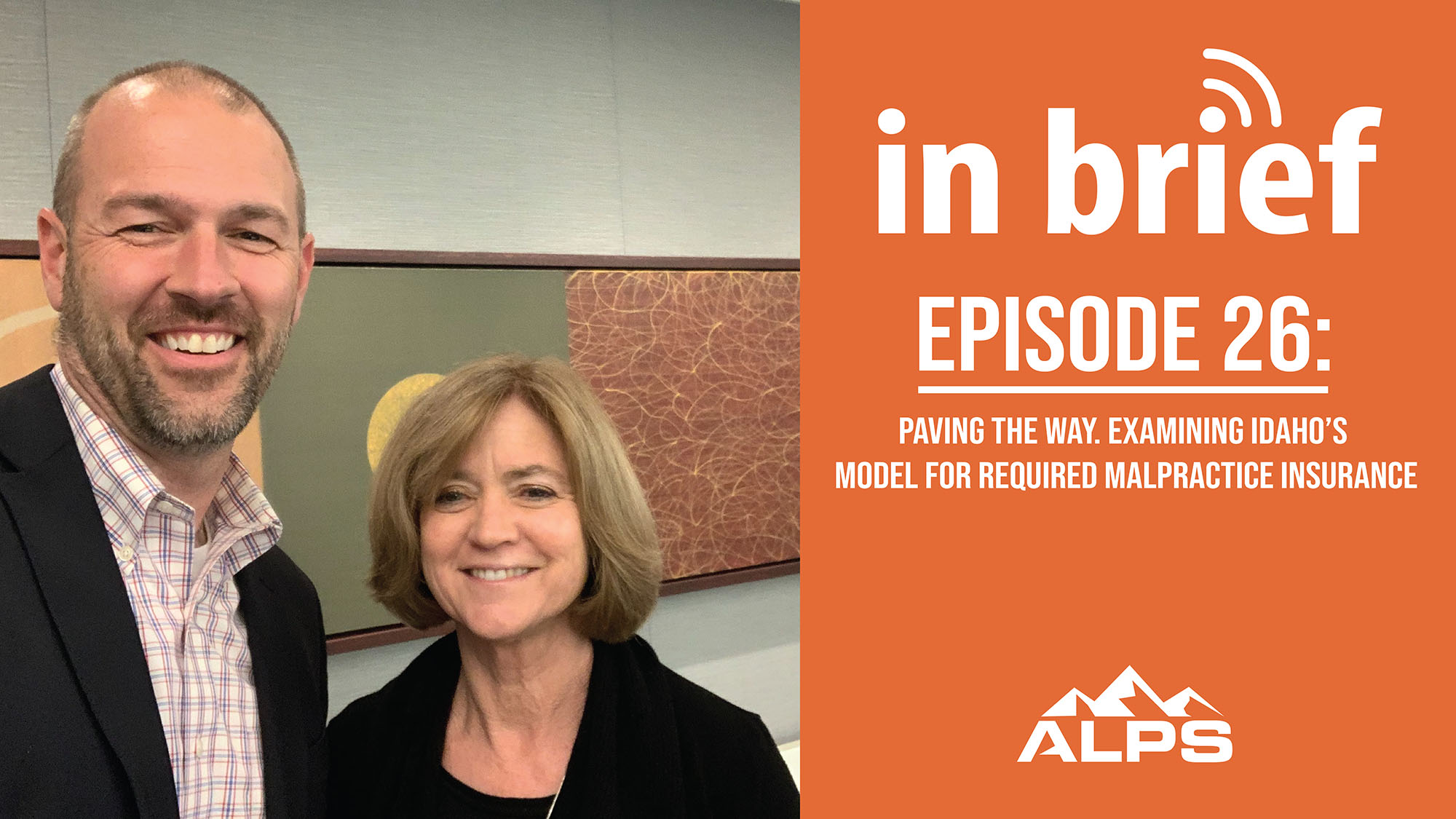9 min read
ALPS In Brief Podcast - Episode 13: Protecting the Public
While he was facilitating the State Bar of Nevada Strategic Planning, ALPS Executive Vice President Chris Newbold, also had the opportunity to sit...
We've crafted solutions tailored to your firm
The world of insurance for law firms can be confusing, and difficult to navigate. We've created this glossary because these common insurance terms should be easy to understand.
9 min read
 Chris Newbold, Chief Operating Officer
:
Updated on February 28, 2024 | Posted on March 22, 2018
Chris Newbold, Chief Operating Officer
:
Updated on February 28, 2024 | Posted on March 22, 2018

ALPS Executive Vice President, Chris Newbold, recently sat down with Doug Ende, the Chief Disciplinary Counsel at the Washington State Bar Association in the Bar’s Seattle offices. Doug was able to shed some light on mandatory malpractice insurance from a disciplinary perspective and how coverage not only protects attorneys but ultimately is a protection for the public as they engage legal services.
ALPS In Brief, The ALPS Risk Management Podcast, is usually hosted by ALPS Risk Manager, Mark Bassingthwaighte. This episode is hosted by Chris Newbold, ALPS Executive Vice President.
Transcript:
CHRIS:
Hello, and welcome to ALPS in Brief. This is Chris Newbold, executive vice president of ALPS, and today I sit in downtown Seattle in the offices of the Washington State Bar Association with Doug Ende, who’s the chief disciplinary counsel of the Washington State Bar Association.
And we’re going to talk about an issue that is kind of growing in popularity, dare I say a trend, perhaps, in the legal world, which is bar associations and regulators thinking about their role with respect to protecting the public and whether they should require mandatory malpractice as a condition of licensure to be an attorney.
So Doug has been working on this issue, and so Doug, maybe you could start off by just introducing yourself and your role, how long you’ve been with the Washington State Bar and what you generally do both with respect to this issue and other responsibilities.
DOUG:
Sure. Thanks, Chris.
I am, as Chris mentioned, the chief disciplinary counsel at the Washington State Bar Association, so my typical portfolio of work is as director of the Office of Disciplinary Counsel, and that is the component of the bar that receives grievances or complaints against lawyers alleging ethical misconduct, investigates those complaints and prosecutes allegations of violations of the Rules of Professional Conduct. So that’s my typical day-to-day work.
I should say that in my capacity as staff support or staff counsel to the Mandatory Malpractice Insurance Task Force, that’s not because there’s a disciplinary dimension to mandatory malpractice insurance, and it’s not the intent and it won’t be the outcome that it’s a disciplinary initiative. It’s a general regulatory initiative.
CHRIS:
Sure. And what do you think was the catalyst to get the discussion going in Washington? I mean, obviously there’s lots of different kind of things going on in terms of some other states looking at this particular subject, but as it relates to Washington, why do you think now the discussion’s happening here?
DOUG:
I would say that there are a number of reasons or catalysts that generated a discussion starting in 2016. One of those catalysts was the existence in Washington State of two other license types: limited practice officers and limited license legal technicians, or LLTs, both of which by rule are required as a matter of licensure to carry malpractice insurance, or otherwise in some cases, to establish proof of financial responsibility. And the gap or the dissonance between one license type being require to have insurance, professional liability insurance, and another license type, the lawyer license type, not having that requirement, began to be questioned.
Simultaneously, there were some members of the Washington State Bar Association that began to inquire of the Board of Governors, “Is this an issue that needs to be revisited in the state of Washington?” And as that exploration happened, the Board of Governors did authorize a work route to start to look into the issue. In 2016, Idaho, seemingly out of nowhere, came on board as requiring mandatory malpractice insurance, becoming, as you know, the second state in the United States to do so.
So I would say those three factors coalesced and became the impetus for further investigation.
CHRIS:
Yeah. And Washington’s obviously what I would consider a large state from a lawyer population size. Talk to us about just kind of the numbers of lawyers that you have in Washington. To the extent that you know, how many are in private practice, to the extent that you know, to what extent there might be a problem in terms of lawyers being uninsured in the Washington legal market in terms of those providing service to clients? What do the numbers tell you?
DOUG:
So the membership of the bar in Washington is relatively large for a west coast state. Setting aside California, which is in another league, Washington I think has the largest population of lawyers in the western states. We have approximately 40,000 members, approximately 32,000 actively licensed lawyers. Unfortunately, I don’t have at my fingertips the breakdown between private practitioners and other practitioners, but there are a great many private practitioners, lawyers, in Washington State.
And we do have the advantage in Washington State of having some information about private practitioners who are insured or not insured, because we do have an insurance disclosure rule. The insurance disclosure rule, which is in our Admission and Practice Rules, is based on the model ABA as a model insurance disclosure rule. And essentially what it requires is as part of annual licensing, lawyers inform the Bar Association whether they’re in private practice, and if so, whether they are carrying professional liability insurance, malpractice insurance.
We’ve had that rule and we’ve been collecting that data for about 10 years now, so we have a reliable and fairly deep data source for that information. And at least in recent years, past three-plus years, what that data shows is that of lawyers in private practice, about 85% are reporting that they carry insurance and 15% are reporting that they do not.
CHRIS:
Okay. And what does your gut tell you about that fact? I mean, you obviously work for an organization that has a mission, a component of your mission that’s protecting the public, right? And with 15% of your lawyers in private practice going uninsured, what do you think about that?
DOUG:
Yeah, absolutely. Part of the Bar Association’s mission is both to serve its members and to serve the public, and certainly a key component of the regulatory mission is to protect the public and make sure legal services are being delivered in the public interest.
From a disciplinary perspective, we do from time to time see the tragic stories where lawyers have made a mistake, there’s been an act of negligence, if you will, the client has been harmed, maybe lost their ability to protect a legal right or lost a remedy of some sort, and in the absence of malpractice insurance or other means of, say, satisfying a judgment or making the client whole, most of those individuals have no legal remedy. And from a regulatory and public protection standpoint, that seems like a failure of the mission.
CHRIS:
Yeah. One of the things I think is very interesting about the issue is there are very clear and stark excellent arguments on both sides of the ledger on this particular issue. If you look at Idaho, for instance, when they put this to a vote of their membership, 51/49, right? It was kind of right on the cusp. And obviously, it went in the favor of yes and went to the Supreme Court and got passed.
I wonder if you could just kind of briefly lay out for us kind of what you see as what’s the argument for, what’s the argument against? Because I do think that the arguments are kind of rock solid on both sides, and most people come at it with kind of a definitive sense of, “This is what I think.”
DOUG:
Right. There are interesting and important arguments on both sides of the issue. And I should say preliminarily that when the Board of Governors, the Washington State Bar Association Board of Governors, authorized this and convened this task force, the issues on both sides were paramount in the minds of the board members. And they made it very clear in the charter of the task force, that job one, literally purpose number one, is to solicit and collect input from Washington State Bar Association members about the issue of mandatory malpractice insurance, so that is an element of what the task force is doing.
The arguments, on the one side, it is fundamentally a public protection argument, that in the absence of insurance, lawyers who are practicing and delivering legal services are putting clients, putting consumers, putting the public, at risk should a circumstance arise where someone is harmed and there isn’t a realistic remedy to address that harm. There’s also perhaps, I’m sure you’re familiar with, a risk management component, that it’s in the best interest of the members to have that protection. And we see that in other context. Not everyone necessarily likes or wants automobile insurance, and yet as a policy, our government has decided that that needs to happen for the protection of others and for the protection of ourselves. And I think some of the arguments here are similar.
CHRIS:
Yeah, particularly as a self-regulating profession, right? I mean, if we’re not regulating ourselves, then we, I think, open ourselves up to other branches of government thinking that they need to regulate us. And so there is kind of some notion of if we’re not leading ourselves in this protection movement, then we’re probably leaving ourselves vulnerable to others kind of infringing in that space.
DOUG:
Absolutely, to the extent we are self-regulating. And of course, we’re ultimately judicially regulated, as the Supreme Court has plenary authority to regulate the practice of law and delegate some of it to the Bar Association. I think it’s obligatory on a somewhat self-regulated profession to not act only in its own interest, but also to act in the public interest.
On the other side of the equation, there are important arguments, multiple arguments, and we’ve seen some of them already come through to the task force, that there’s a cost issue. It’s going to add yet another cost of doing business to this regulated industry, and I think it’s fair to say that no one likes the idea intrinsically of adding more cost to the cost of doing business. Related to that argument, there are those who argue because of the nature of their practice, the cost is prohibitive, because as you well know, not every practice area presents the same risk, and therefore, insures at the same cost.
Some arguments relate to where particular lawyers are in the continuum of practice. So for example, lawyers at the tail end of practice thinking about winding things down or in the midst of winding things down I think are concerned that given the level or magnitude of the practice, which is perhaps diminished, the cost of obtaining malpractice insurance would outweigh the value of continuing to maintain an active license. So they suggest that for retired or nearing retirement practitioners, this may drive them out of practice for new lawyers just coming in to the profession, perhaps carrying a substantial debt load from law school and perhaps even larger than just law school. Again, there’s a cost concern.
And then finally, and I’m not necessarily naming every conceivable objection to mandatory malpractice insurance, but some point to an issue of uninsurability. I don’t know of the extent to that’s true. You probably know more about insurability versus uninsurability than I, but I think some members are concerned that if there are truly uninsurable risks that those individuals are going to be forced out of practice because they just can’t obtain obligatory insurance.
CHRIS:
Sure, sure. So where are you at now in your process? Obviously the task force is being convened. As you think about the next 12 to 18 months, where do you see that process going, and then ultimately, what steps does the task force envision kind of taking in terms of recommendations and so forth?
DOUG:
We are still in the fairly early stages of our process. The board launched the task force by adopting its charter in September of 2017. The task force was convened and had its first meeting last month. We are in February of 2018. The task force is about to begin its second meeting. So we are really still at the headwaters, the information-gathering stage. So the Board of Governors through its charter asked for a report and recommendation from the task force in January of 2019. So they gave the task force about a year to do the work, determine what its recommendation would be, and prepare its report back to the Board of Governors.
So what we expect is at some point the task force will make a recommendation. I wouldn’t be surprised if it evaluated more than one possible solution to the issue, malpractice versus other initiatives that might service the same or a similar public protection purpose. And we’ll solicit and gather input from the WSBA membership when those recommendations start to solidify, and then based on all of that information, we’ll report back to the board, we fully expect, in January 2019.
CHRIS:
Okay. Well, good.
Doug, any other kind of closing comments or remarks or kind of perspectives that you’d like to share with our audience?
DOUG:
Should any WSBA members find themselves interested in the issue, or even others find themselves interested in the issue, and care to share their perspective with the task force, with the Board of Governors, now would be a good time. There is a web page on the WSBA website devoted to the activities of the task force, so it’s easily accessible and it’s easy to provide feedback through electronic means, and we are be eager to hear from the membership, to hear from the public, to hear from others, about these ideas.
CHRIS:
Great. Well, thank you, Doug. I mean, this is an interesting subject, obviously one that we’re kind of keeping a close eye on as the endorsed malpractice carrier for the Washington State Bar Association. And I think the carriers are obviously thinking about the affordability issue and whether even some insurance at a good or a basic level is better than no insurance, and particularly your solo practitioner community is a community that we’re particularly sensitive to as we think ahead to the future of the market.
DOUG:
Sure.
CHRIS:
Well, good. I appreciate the time, Doug.
And if you have any other thoughts or questions about this subject, feel free to contact me, Chris Newbold at ALPS, cnewbold@alpsnet.com, and we thank you for listening.
DOUG:
Thanks, Chris.
Douglas J. Ende is the Chief Disciplinary Counsel at the Washington State Bar Association in Seattle. Prior to joining the WSBA staff in 1998, Mr. Ende served as a judicial law clerk, an associate at a Seattle law firm, an instructor at the University of Washington School of Law, a public defender, and a partner in a criminal-defense-oriented law firm. He is a graduate of the Johns Hopkins University and the University of Washington School of Law. He has never run a marathon or watched an episode of Downton Abbey.
ALPS is the endorsed lawyers’ malpractice insurance carrier of the Washington State Bar Association.
ALPS In Brief Podcast Intro/Outro Music: Walk In The Park by Audionautix is licensed under a Creative Commons Attribution 4.0 license. https://creativecommons.org/licenses/by/4.0/
Artist: http://audionautix.com/
Chris L. Newbold is Executive Vice President of ALPS Corporation and ALPS Property & Casualty Insurance Company, positions he has held since 2007. As Executive Vice President, Chris oversees ALPS business development team, sales strategy and served as ALPS’ chief liaison into the bar association community until 2023. Externally within legal circles, Chris is a recognized nationally based on his roles as a strategic planning facilitator to bar associations and bar foundations, his leadership work in the lawyer well-being movement and his work advising states regulators and / or bar associations exploring the merits of implementing mandatory malpractice insurance requirements or stricter client disclosure rules. On the strategic planning front, Chris’ lawyer credentials, knowledge of legal industry trends and keen observations into bar association relevance catapulted him into desired facilitator in legal conversations nationally. Chris' unique and innovative strategic planning approach have resulted in his leading retreats and legal conversations at the national, state and local levels, including with State Bars in Maine, Vermont, Virginia, Kansas, South Dakota, North Dakota, Montana, Idaho, Wyoming, Nevada, the U.S. Virgin Islands, as well as the National Conference of Women’s Bar Associations. On the issue of lawyer well-being, Chris has been at the epicenter of discussion both strategically and as an advocate. As co-author of the movement launching 2016 report The Path to Lawyer Well-Being: Practical Recommendations for Positive Change, his leadership as co-chair of the National Task Force on Lawyer Well-Being, his participation on the ABA’s Working Group to Advance Well-Being in the Legal Profession, his role as co-host The Path to Well-Being in Law podcast, and his time as President of The Institute of Well-Being in Law Chris has been at the forefront of a movement intent on creating a culture shift in the legal profession, and advancing personal and professional satisfaction in all sectors of legal life. Chris has also been active nationally counseling State bar associations and regulators on the viability of requiring lawyers to maintain malpractice insurance as a condition of licensure. Given Chris’ insurance industry knowledge, particularly within small firms and solo practitioners, his insights have been additive to the conversations in states like Nevada, Washington, California and Idaho. Chris is also well versed in alternatives to mandatory insurance like client disclosure rules. Chris received his law degree from the University of Montana School of Law in 2001 and holds a bachelor’s degree from the University of Wisconsin-Madison (1994). Following his graduation from law school, he served one year as a law clerk for the Honorable Terry N. Trieweiler of the Montana Supreme Court. After his clerkship, he launched his ALPS career as President and principal consultant of ALPS Foundation Services, a non-profit fundraising and philanthropic management consulting firm. In that capacity, he authored The Complete Guide to Bar Foundations in conjunction with the National Conference of Bar Foundations. Outside of the law, Chris is currently chair of the board of directors of the University of Montana Alumni Association, has authored two children’s book about collegiate mascots (The Big Bucky Badger Mystery (Wisconsin) and The Wild Wolf Pack Mystery (Nevada)) and enjoys his Montana lifestyle with his wife, Jennifer, and their three children, Cameron, Mallory and Lauren.

9 min read
While he was facilitating the State Bar of Nevada Strategic Planning, ALPS Executive Vice President Chris Newbold, also had the opportunity to sit...

11 min read
Recorded from the Washington State Bar Association offices in Seattle, ALPS Executive Vice President, Chris Newbold, sits down with WSBA Executive...

9 min read
Last year, Idaho became the second state to require malpractice insurance for private practitioners — and the first to adopt an open-market model...